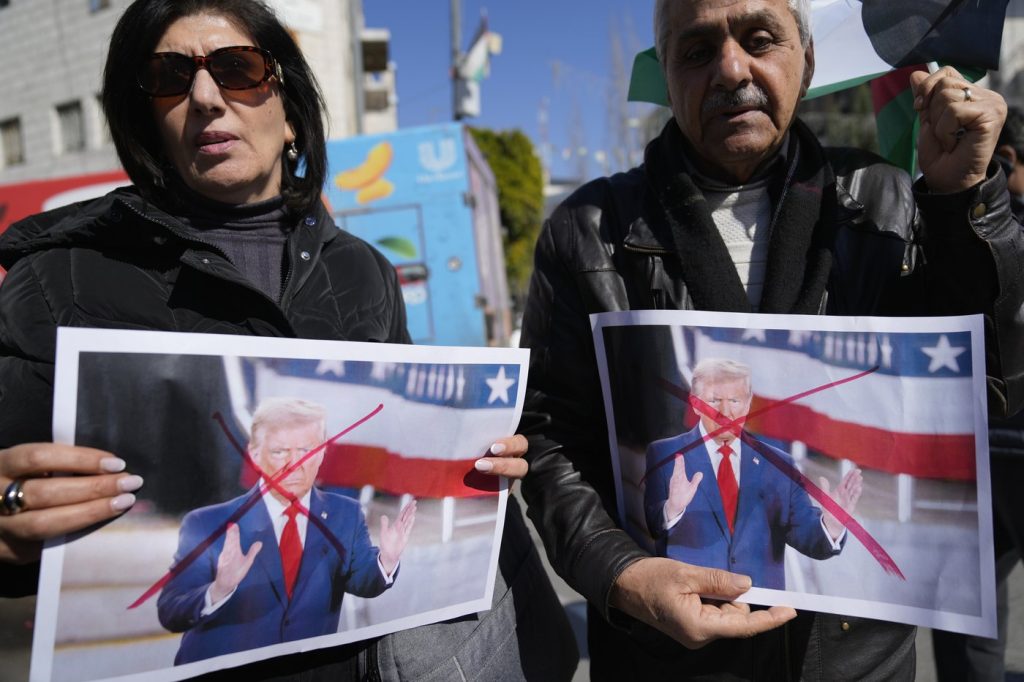DUBAI, United Arab Emirates (AP) – President Donald Trump’s recent proposal for the United States to take over the Gaza Strip and resettle its Palestinian residents met with swift and widespread condemnation from both American allies and adversaries during a White House news conference held on Wednesday. Trump made his controversial remarks alongside Israeli Prime Minister Benjamin Netanyahu, who appeared supportive as Trump outlined plans for developing Gaza into "the Riviera of the Middle East."
In his announcement, Trump stated, “The U.S. will take over the Gaza Strip, and we will do a job with it too. We’ll own it and be responsible for dismantling all of the dangerous unexploded bombs and other weapons on the site, level the site, and get rid of the destroyed buildings.” His proposal coincided with a fragile ceasefire between Israel and Hamas, during which hostages were being exchanged for Palestinian prisoners.
The proposal was swiftly rebuffed by regional allies, including Egypt and Jordan, which emphasized the necessity of rebuilding Gaza without displacing its Palestinian population. Egypt’s Foreign Ministry highlighted the importance of restoring Gaza while keeping its residents in place. Meanwhile, Saudi Arabia, a significant U.S. ally, underscored its unwavering commitment to the establishment of an independent Palestinian state, rejecting any infringement on Palestinian rights.
Australian Prime Minister Anthony Albanese reiterated his nation's longstanding support for a two-state solution, stating that Australia’s position on the matter remained unchanged over the years. He expressed frustration at the media's focus on Trump’s proposal, reinforcing his government’s consistent policy. New Zealand’s Foreign Ministry also reaffirmed its support for a two-state solution, wishing to avoid commenting on every new proposal from the U.S.
The Chinese Foreign Ministry added its voice to the opposition against Trump’s comments, emphasizing the importance of not forcibly relocating people in Gaza and calling for the Palestinian issue to be addressed appropriately. Turkish Foreign Minister Hakan Fidan described the idea of deportations suggested by Trump as “wrong and absurd,” indicating that such actions would not be accepted by the region.
Responses from Palestinian leadership were equally stark. Palestinian President Mahmoud Abbas called upon the United Nations for protection of Palestinian rights, labeling Trump’s proposal as a violation of international law. Hamas, the militant group responsible for initiating the recent conflict, condemned the suggestion as a “recipe for creating chaos and tension” and criticized it as rewarding the Israeli occupation instead of holding it accountable.
In the United States, opposition politicians voiced their disapproval of Trump’s comments. Democratic Senator Chris Coons described the proposal as "offensive and insane," warning that it risks portraying the U.S. as an unreliable partner on the world stage. He questioned the rationale behind abandoning established humanitarian efforts to propose an extensive and complex intervention in Gaza.
Similarly, Democratic Representative Rashida Tlaib, a Palestinian American, accused Trump of advocating for ethnic cleansing with his suggestion to resettle an entire population. Her remarks highlight the gravity of the situation and the sensitivity surrounding U.S. involvement in the ongoing crisis.
The ramifications of Trump’s statement are significant, as they further complicate the already strained relationships in the Middle East and provoke strong reactions from various international actors. The proposal looks set to draw continued scrutiny both domestically and abroad as discussions about the future of Gaza continue.










